On this day on 7th June
On this day in 1887 Rachel (Ray) Strachey, was born in London. She attended Kensington High School before studying mathematics at Newnham College (1905-1908). While at the University of Cambridge she was an active member of Cambridge University Women's Suffrage Society.
After leaving university she became secretary of the West of England Women's Suffrage Society. In 1911 she married Oliver Strachey. Over the next few years they had two children, Christopher and Barbara.
In 1913 Ray Strachey was elected chairman of the London Society for Women's Suffrage. In 1916 she was honorary parliamentary secretary of the National Union of Women's Suffrage Societies responsible for supervising the passage of the Qualification of Women Act. At the 1918 General Election she stood unsuccessfully for the House of Commons. Later she worked as political secretary to Nancy Astor, the first female MP.
In 1921 Strachey built a house in Fernhurst. The author, Helena Wojtczak, has pointed out: "She bought nine acres of land and built a house of pisé de terre (rammed earth). She named it Copse Cottage but it is known to this day as the Mud House. She installed an 80ft x 30ft pool (where she swam in the nude), and acquired WLA clothing - corduroy breeches, boots and a straw hat - to wear around her estate." Virginia Woolf was a frequent visitor.
After the First World War she was the editor of The Common Cause and then of its successor, The Women's Leader. Ray Strachey was also the author of Women's Suffrage and Women's Service (1928), The Cause: A Short History of the Women's Movement in Great Britain (1928) and Millicent Garrett Fawcett (1931).
In 1935 Strachey was appointed as head of the Women's Employment Federation and subsequently published Career Openings for Women (1935).
Ray Strachey died on 16th July 1940 in the Royal Free Hospital of heart failure, following an operation to remove a fibroid tumour.
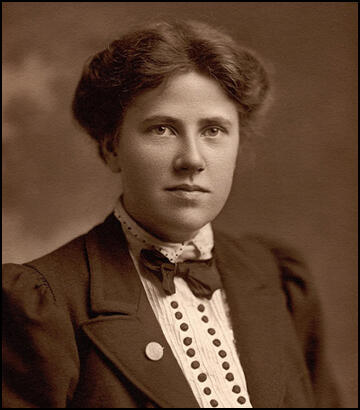
On this day in 1913 Emily Wilding Davison brings down the king's horse in the Derby. Davison was convinced that women would not win the vote until the suffragette movement had a martyr. Emily took the decision to draw attention to the suffragette campaign by jumping down an iron staircase. Emily landed on wire-netting, 30 feet below. This prevented her death but she suffered severe spinal injuries.
Once she had recovered her health, Emily Davison began making plans to commit an act that would give the movement maximum publicity. In June, 1913, she attended the most important race of the year, the Derby, with Mary Richardson: "A minute before the race started she raised a paper on her own or some kind of card before her eyes. I was watching her hand. It did not shake. Even when I heard the pounding of the horses' hoofs moving closer I saw she was still smiling. And suddenly she slipped under the rail and ran out into the middle of the racecourse. It was all over so quickly." Davison ran out on the course and attempted to grab the bridle of Anmer, a horse owned by King George V. The horse hit Emily and the impact fractured her skull and she died on 8th June without regaining consciousness.
Among the articles found in her possession were two WSPU flags, a racecard, and a return train ticket to Victoria Station. This has resulted in some historians arguing that she did not intend to kill herself. Sylvia Pankhurst has argued: "Emily Davison and a fellow-militant in whose flat she lived, she had concerted a Derby protest without tragedy - a mere waving of the purple-white-and-green at Tattenham Corner, which, by its suddenness, it was hoped would stop the race. Whether from the first her purpose was more serious, or whether a final impulse altered her resolve, I know not. Her friend declares she would not thus have died without writing a farewell message to her mother." Other research has indicated that Davidson intended to attach a WSPU scarf to the king's horse.
However, Emmeline Pankhurst believed that Davidson wanted to become a martyr. She wrote in her biography, My Own Story (1914): "Emily Davison clung to her conviction that one great tragedy, the deliberate throwing into the breach of a human life, would put an end to the intolerable torture of women. And so she threw herself at the King's horse, in full view of the King and Queen and a great multitude of their Majesties' subjects."
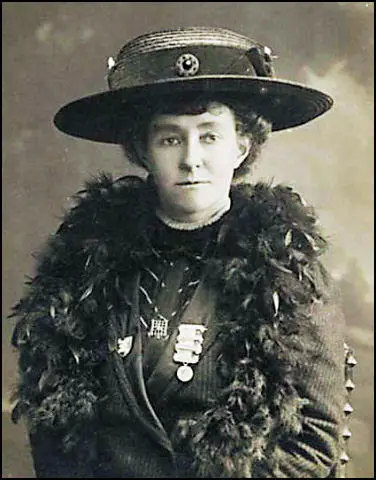
On this day in 1919 the U.S. Congress approves the 19th Amendment, which guarantees suffrage to women. In January, 1918, Woodrow Wilson announced that women's suffrage was urgently needed as a "war measure". The House of Representatives passed the federal woman suffrage amendment 274 to 136 but it was opposed in the Senate and was defeated in September 1918. Another attempt in February 1919 also ended in failure.
In May 1919 the House of Representatives again passed the amendment (304 to 89) and on 4th June 1919 the Senate finally gave in and passed it by 66 to 30. On 26th August 1920 the Nineteenth Amendment was certified by the Secretary of State, when Tennessee, the thirty-sixth and final state needed, signed for ratification.
One of the campaigners, Crystal Eastman, argued: "The problem of women's freedom is how to arrange the world so that women can be human beings, with a chance to exercise their infinitely varied gifts in infinitely ways, instead of being destined by the accident of their sex to one field of activity - housework and child-raising. And second, if and when they choose housework and child-raising to have that occupation recognized by the world as work, requiring a definite economic reward and not merely entitling the performer to be dependent on some man. I can agree that women will never be great until they achieve a certain emotional freedom, a strong healthy egotism, and some unpersonal source of joy - that is this inner sense we cannot make women free by changing her economic status."
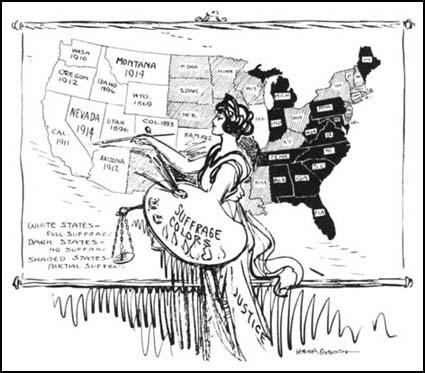
Maryland Suffrage News (14th November, 1914)
On this day in 1945 Winston Churchill makes an attack on socialism that loses him the 1945 General Election. "I must tell you that a socialist policy is abhorrent to British ideas on freedom. There is to be one State, to which all are to be obedient in every act of their lives. This State, once in power, will prescribe for everyone: where they are to work, what they are to work at, where they may go and what they may say, what views they are to hold, where their wives are to queue up for the State ration, and what education their children are to receive. A socialist state could not afford to suffer opposition - no socialist system can be established without a political police. They (the Labour government) would have to fall back on some form of Gestapo."
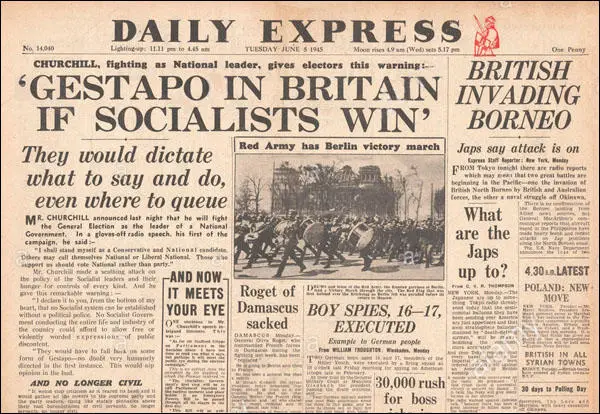
On this day in 1962 I. F. Stone writes about the Freedom Riders. "Norman Thomas, spoke if them as "secular saints" - this handful of young Negroes in their teens and early twenties. They and a few white sympathizers as youthful and devoted as themselves have begun a social revolution in the South with their sit-ins and their Freedom Rides. Never has a tinier minority done more for the liberation of a whole people than these few youngsters of C.O.R.E. (Congress for Racial Equality) and S.N.C.C. (Student Non-Violent Coordinating Committee)."
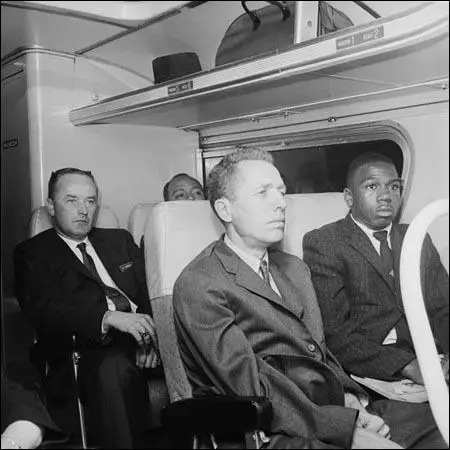
On this day in 1965 Lyndon Baines Johnson makes speech at Howard University in favour of a new Voting Act.
At times history and fate meet at a single time in a single place to shape a turning point in man's unending search for freedom. So it was at Lexington and Concord. So it was a century ago at Appomattox. So it was last week in Selma, Alabama.
There, long-suffering men and women peacefully protested the denial of their rights as Americans. Many were brutally assaulted. One good man - a man of God - was killed.
This was the first nation in the history of the world to be founded with a purpose. The great phrases of that purpose still sound in every American heart, North and South: "All men are created equal" - "Government by consent of the governed" - "Give me liberty or give me death". And those are not just clever words and not just empty theories. In their name Americans have fought and died for two centuries.
Experience has clearly shown that the existing process of law cannot overcome systematic and ingenious discrimination. No law that we now have on the books can ensure the right to vote when local officials are determined to deny it. Wednesday I will send to Congress a law designed to eliminate illegal barriers to the right to vote. This bill will strike down restrictions to voting in all elections - federal, state, and local - which have been used to deny Negroes the right to vote.
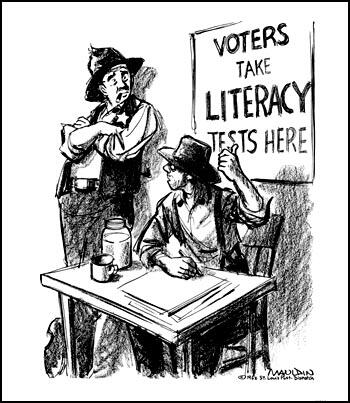
Bill Mauldin, St. Louis Post-Dispatch (15th May 1962)

